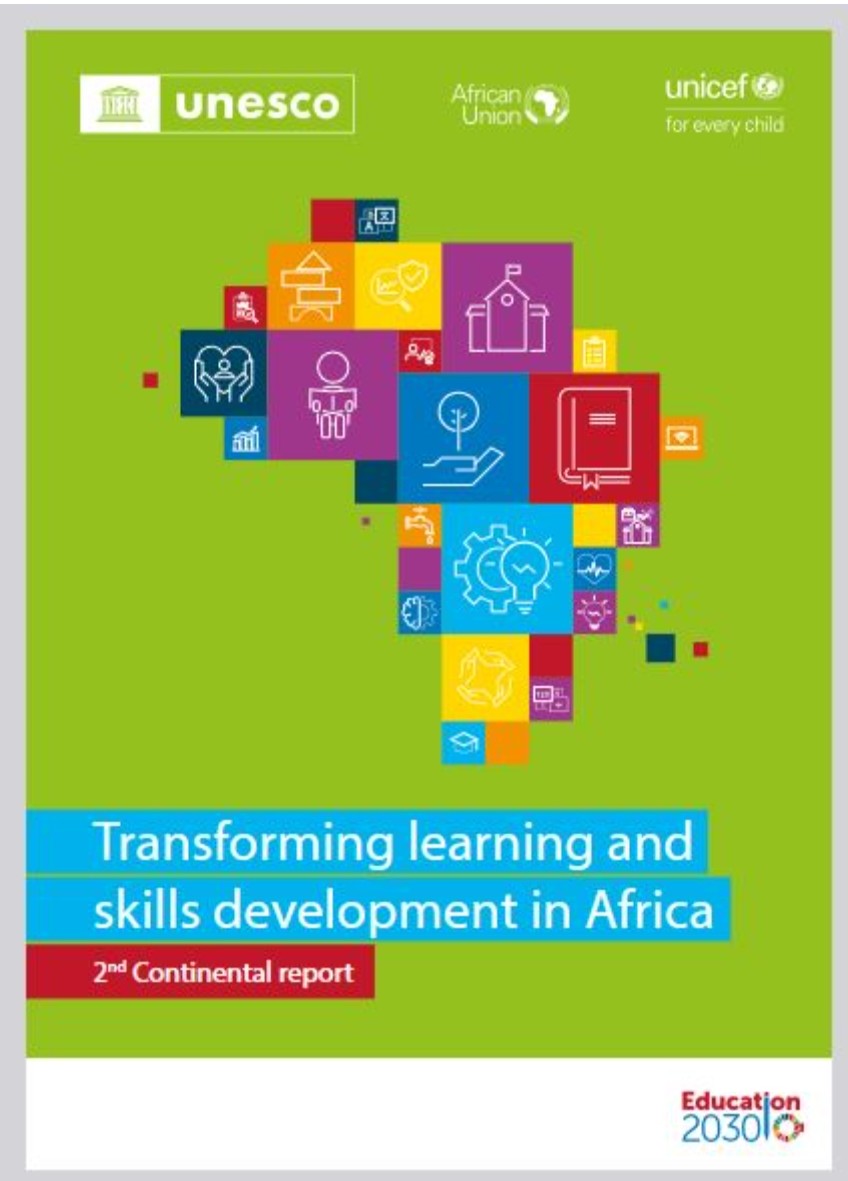
UNESCO, in partnership with UNICEF and the African Union, has launched the Second Continental Report on SDG4 and CESA during the Pan-African Conference on Teacher Education (PACTED).
The event coincided with the official launch of the African Union Decade of Accelerated Action for the Transformation of Education and Skills Development in Africa (2024–2035).
Titled Transforming Learning and Skills Development in Africa, the report marks a shift from broad diagnostics to concrete, evidence-based solutions. It highlights scalable policies and practices that are driving real change across the continent.
With Africa’s youth projected to represent 42% of the global youth population by 2030, the stakes have never been higher. The report identifies seven promising approaches—from inclusive education and alternative learning pathways to teacher learning communities, education and TVET financing, and data-driven planning—designed to bridge persistent gaps in access, quality, and relevance, while equipping young Africans with the skills needed for the future.
The launch was co-chaired by Professor Gaspard Banyankimbona, African Union Commissioner for Education, Science, Technology and Innovation; Mr. Abdoulaye Salifou, Head of the Education Sector at the UNESCO Liaison Office to the African Union; and Ms. Laila Gad, UNICEF Representative to the African Union. Together, they reaffirmed UNESCO and UNICEF’s joint commitment to advancing SDG4 and CESA.
Partners and participants emphasized the importance of the newly proclaimed African Union Decade of Accelerated Action for the Transformation of Education and Skills Development in Africa (2025–2034). Building on this momentum, UNESCO and UNICEF renewed their pledge to strengthen coordinated action to accelerate education transformation across the continent.
“These commitments set the stage for tangible results,” said Mr. Salifou, speaking on behalf of UNESCO. “This is more than a report—it’s a call to action. The success of this Decade depends on all of us—governments, civil society, the private sector, and international partners. Let’s build Africa’s future on education, drive bold innovation, and collaborate across borders to share what works best.”
The full report is available online: Executive Report | Full Report
UNESCO – a global leader in education
Education is UNESCO’s top priority because it is a basic human right and the foundation for peace and sustainable development. UNESCO is the United Nations’ specialised agency for education, providing global and regional leadership to drive progress, strengthening the resilience and capacity of national systems to serve all learners. UNESCO also leads e fforts to respond to contemporary global challenges through transformative learning, with special focus on gender equality and Africa across all actions.
The Global Education 2030 Agenda UNESCO, as the United Nations’ specialised agency for education, is entrusted to lead and coordinate the Education 2030 Agenda, which is part of a global movement to eradicate poverty through 17 Sustainable Development Goals by 2030. Education, essential to achieve all these goals, has its own dedicated Goal 4, which aims to “ensure inclusive and equitable quality education and promote lifelong learning opportunities for all”. The Education 2030 Framework for Action provides guidance for the implementation of this ambitious goal and commitments.
The African Union (AU) is a continental body consisting of the 55 member states that make up the countries of the African Continent. Guided by its vision of “An integrated, prosperous and peaceful Africa, driven by its own citizens and representing a dynamic force in the global arena”, AU promotes Africa’s growth and economic development by championing citizen inclusion and increased cooperation and integration of African states. In Education, the AU contributes to development of human resources and intellectual capital through facilitating access to revitalised, quality, relevant, harmonised education and training systems, whilst ensuring gender equality, safe and healthy learning environments. The AU is implementing the Continental Education Strategy (CESA 16-25) that capitalises on education actors, Member States, Regional Economic Communities and Development Partners, among others, to collectively transform the education systems in Africa, focusing on Early Childhood Education, Higher Education, TVET, Teacher Development, Curriculum Development, among other CESA strategic objectives.
UNICEF is mandated by the United Nations General Assembly to advocate for the protection of children’s rights, to help meet their basic needs and to expand their opportunities to reach their full potential. UNICEF works in more than 190 countries and territories in seven regions, across both development and humanitarian contexts. Guided by the Convention on the Rights of the Child and supporting the 2030 Agenda for Sustainable Development, UNICEF works to save children’s lives, defend their rights, and help them fulfill their potential, from early childhood through adolescence. As a multisectoral agency with wide on-the-ground presence and deep field experience, UNICEF is able to maximize results for children through its support to reinforce interventions across sectors and systems. commitments.
